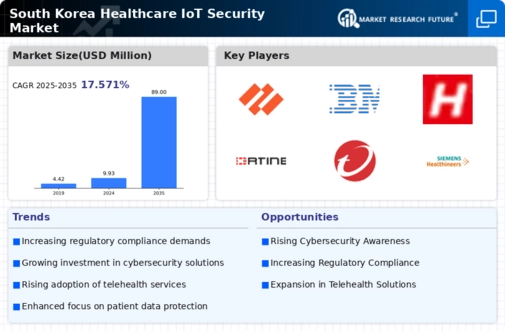Rising Cybersecurity Threats
The healthcare iot-security market in South Korea is experiencing heightened demand due to the increasing frequency and sophistication of cyberattacks targeting healthcare systems. As hospitals and clinics adopt more connected devices, the potential vulnerabilities also rise. Reports indicate that cyber incidents in the healthcare sector have surged by over 30% in recent years, prompting organizations to invest heavily in security measures. This trend underscores the necessity for robust security frameworks to protect sensitive patient data and ensure compliance with regulations. The urgency to safeguard against these threats is driving growth in the healthcare iot-security market, as stakeholders seek solutions that can mitigate risks and enhance overall system integrity.
Growing Adoption of IoT Devices
The proliferation of Internet of Things (IoT) devices within healthcare settings is a significant driver for the healthcare iot-security market in South Korea. With an estimated 50 million connected medical devices projected by 2026, the need for effective security solutions becomes paramount. These devices, ranging from wearable health monitors to advanced imaging systems, generate vast amounts of data that require protection. As healthcare providers increasingly rely on IoT technology to improve patient outcomes and operational efficiency, the demand for security solutions that can safeguard these devices and the data they transmit is likely to escalate. This trend is expected to contribute substantially to the growth of the healthcare iot-security market.
Government Initiatives and Funding
Government initiatives aimed at enhancing cybersecurity in the healthcare sector are playing a crucial role in shaping the healthcare iot-security market in South Korea. The government has introduced various funding programs and incentives to encourage healthcare organizations to adopt advanced security measures. For instance, recent allocations of over $100 million for cybersecurity initiatives in healthcare are expected to bolster the market. These initiatives not only provide financial support but also establish frameworks for best practices in security management. Consequently, the healthcare iot-security market is likely to benefit from increased public sector investment, fostering innovation and the development of new security solutions.
Increased Patient Data Privacy Concerns
Concerns regarding patient data privacy are intensifying in South Korea, significantly impacting the healthcare iot-security market. With the rise of digital health records and telemedicine, patients are more aware of their data rights and the potential risks associated with data breaches. Recent surveys indicate that over 70% of patients express anxiety about the security of their personal health information. This growing awareness is prompting healthcare organizations to prioritize data protection strategies, thereby driving investments in security technologies. As a result, the healthcare iot-security market is likely to expand as providers seek to implement solutions that not only comply with regulations but also build trust with patients.
Emergence of Advanced Security Technologies
The emergence of advanced security technologies, such as artificial intelligence (AI) and machine learning (ML), is significantly influencing the healthcare iot-security market in South Korea. These technologies offer innovative solutions for real-time threat detection and response, which are essential in a landscape characterized by evolving cyber threats. As healthcare organizations seek to enhance their security postures, the integration of AI and ML into security frameworks is becoming increasingly common. This trend suggests that the healthcare iot-security market will continue to grow as organizations adopt these cutting-edge technologies to protect sensitive data and ensure compliance with regulatory standards.



















Leave a Comment